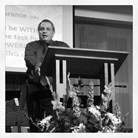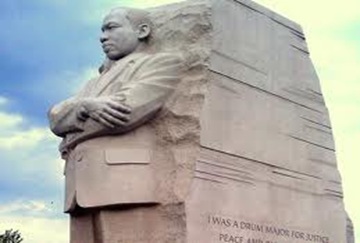“A Piece of My Mind”
September 2013 Newsletter from Donald Shoemaker
Advancing Christian Faith and Values, Defending Religious Liberty for All, Supporting Civility and the Common Good through Preaching, Teaching, Writing, Activism and Reasoned Conversations

Religious Liberty Vigilance –
Ignorance of Religious Rights
“Congress shall make no law respecting an establishment of religion, or prohibiting the free exercise thereof…”
– 1st Amendment (Our “First Freedom” in the Bill of Rights)
“Eternal vigilance is the price of liberty”
– Attributed to Thomas Jefferson and others
This is scary. Most don’t know our religious freedom rights. Many wouldn’t agree with them if they did.
One-third of Americans think the First Amendment “goes too far” in the rights it guarantees (its five great freedoms are: religious freedom, freedom of speech, a free press, right of assembly and right to petition the government). That’s up greatly from 13% the year before, which is still too high (the great shift raises questions about how it was determined).
Whereas religious freedom is our first liberty in the First Amendment, Americans value free speech (47%) over religious liberty (10%). And only 24% of Americans recognized religious liberty as one of our five freedoms.
I find two disturbing cultural trends. First, we hear people in government speak of “freedom of worship” rather than “freedom of religion”. Freedom to worship as you wish is vital, but by itself it truncates religious freedom. Freedom of religion includes the right to speak your faith and practice your faith outside the walls of worship and out into the broader culture without government repercussion.
Second, when you start talking specific issues and policies that might hinder religious liberty, the general public is more likely to side with advocates of an issue or policy than with religious institutions or individuals who have religion-rooted objections to it and don’t want to be forced to violate their consciences.
Ken Paulson, President of the First Amendment Center at the Newseum Institute, rightly says, “It’s important to recognize that our core freedoms, regardless of their relative popularity, complement and reinforce one another. Unless we daily reaffirm our right to America’s core liberties and speak out against government encroachment upon any of them, our collective freedom is at risk. ‘United we stand’ is not just a motto.”
[To review the survey, go to Paulson’s commentary at: www.firstamendmentcenter.org]
“Prophets are Good for Business”
(Applying Biblical Principles to Work Situations)
God’s Special Day Should Affect Every Other Day –
Sabbath-keeping (part 4)
“‘When will…the Sabbath be ended that we may market wheat?’ – skimping the measure, boosting the price and cheating with dishonest scales, buying the poor with silver and the needy for a pair of sandals, selling even the sweepings with the wheat.” – Amos 8:4-6 New Int’l. Version
I heard once that the “Post-It” note idea was thought up by a man while he sat in the choir loft during church services. True or not, imagine this—turning business ideas around in your mind while you should be listening to the sermon or joining in on worship! The prophet Amos was as frustrated as any modern preacher when he thought about how people would ponder business matters during hours that should be most sacred.
It gets worse! Amos tells what they will be pondering: how to cheat customers, take advantage of the poor and needy and compromise their products for profit’s sake. So Sabbath observance had no effect on how they would live the other six days of the week. The reason is, they were not really “thinking Sabbath”—letting its meaning get deep into their hearts.
“Thinking Sabbath” will remind us we cannot separate what we do and think on the one day of worship from what we do and think on the six other days. Worshipping God in church cannot disconnect from our business dealings, our ethical management and our dutiful service to our employer or employees on Monday.
Show me a man or woman who truly “keeps the Sabbath” and I’ll show you a man or woman who treats customers well, is honorable with money, works at business ethically and keeps his or her word.
Bible Insight: Forgiveness—What Does God Require?
“Forgive us our sins, for we also forgive everyone who sins against us.”
(Luke 11:4—Jesus’ teaching in “The Lord’s Prayer”)
I conducted the funeral for one of the victims of Orange County California’s worst mass murder—eight slain on October 12, 2011. In that sermon I said, “I do not believe in unconditional forgiveness.”
A funeral director present who also was a Christian was so surprised and amazed at my words that he sent me an email!
I realize that this position is not the thinking du jour. But Jesus taught it! Forgiveness from God is conditioned on our generous willingness to be people of forgiveness (Matthew 6:12). If we exhaust the steps of reconciliation in trying to restore one who has sinned against us, that person is to be expelled from the church (Matthew 18:15-18). The church is thus to exclude, not forgive. If the one who wronged us repents, we are to forgive (Luke 17:3-4).
And we are to forgive “just as in Christ God forgave you” (Ephesians 4:32). God’s forgiveness is not without satisfaction of his justice. Jesus Christ satisfied God’s justice as a sacrifice for our sins. Nor does God’s forgiveness come without repentance before God on our part.
The thinking du jour about forgiveness is this: when someone sins against us we should immediately forgive that person in our hearts.
The argument goes, why should you allow the villain to score a double victory against you? He sins against you. Then you allow his deed to eat away inside you, filling you with spite and bitterness. So you “forgive in your heart” for your sake! Forgiveness, then, is an internal thing, a form of self-therapy. It is not primarily a relational thing—something extended to another (that true forgiveness involves the heart is not to be denied).
Leave it to American Christians to turn a principle on relational restoration into a therapeutic principle of how to care for the self! But hey, we already did that when we turned the altruistic Second Great Commandment into a self-love motivator (“You can’t ‘love your neighbor as yourself’ until you first learn to love yourself.”).
No, we certainly ought not let a wrongdoer’s wicked deed eat us up inside. That’s why Scripture also says, “Do not let the sun go down while you are still angry” and, “Get rid of all bitterness, rage and anger, brawling and slander, along with every form of malice” (Ephesians 4:26, 31).
But this is not what it means to “forgive in your heart.”
Jesus’ followers are to forgive as God does—generously, willingly, readily, repeatedly, and taking the initiative with the wrongdoer. This may require restitution (or circumstances may call for a release from what is owed). It certainly requires genuine remorse and repentance by the wrongdoer.
Anything less is not God’s forgiveness working in us.
Don’s Upcoming Ministries

October 27 – Speak in Sunday Morning Worship Services at Grace Community Church of Seal Beach (8:00, 9:30, 11:00)

Good News from Grace— September Sundays
- September 1 – Children’s Ministry starts its fall Sunday School schedule.
- September 8 – Sign-ups for one or more of the many “Life Group” ministry opportunities at Grace.
- September 15 – Open House for the redecorated Children’s Ministry area on the church’s third floor.
- September 22 – Baptismal Service
- September 29 – World Impact Sunday as we commission a new missionary—our own Renee Robitaille; Women’s Charity Luncheon

Message of the Month – “Fish Wars” (Science vs. Religion)
The “Fish Symbol” is an old, old symbol of Christianity. It became popular again in the 1960’s through what was then known as “The Jesus Movement.”
Sometimes the fish symbol will take on unusual characteristics, like a fish swallowing “Darwin” or “truth” eating the fish. I call these silent communicators (on the back of cars typically) “fish wars.” I took the above picture of a nearby car when I parked one day at 24-Hour Fitness.
“It’s not rocket science” to see what is intended. Science supplants religion. Science knows. Science is what really gets us places. So they say.
I can’t explain the science/religion debate in a short space. But here’s a capsule of my views. Science speaks on intermediate issues. Religion speaks on ultimate issues. For example, science can explain the “food chain” but only faith can tell us this:
These [sea and land creatures] all look to you [God]
to give them their food at the proper time.
When you give it to them, they gather it up.
When you open your hand, they are satisfied with good things.
(Psalm 104:27-28)
Another example: science can discover and theorize about tectonic plates. Faith teaches the ultimate truth:
May the Lord rejoice in his works—
He who looks at the earth, and it trembles,
who touches the mountains and they smoke.
(Psalm 104:31-32)
By faith we see an ultimate—a Creator God who made all things and governs them by his word and power. And he has graciously given us a “care manual.”
Jesus taught us, “Man does not live by bread alone, but on every word that comes from the mouth of God” (Matthew 4:4). One lesson we learn from this is that we need to look at life’s possibilities from two directions: (1) what we can do (what science has made possible, like how to grow the best wheat for bread) and (2) what we should do (doing right instead of wrong). Nazi experimenters lived by the can but not by the should.
And this brings us back to the rocket. Science enables us to launch a rocket (or fly a drone) and guide its payload to its intended target. Values from faith guide us to decide whether delivering that payload to its target is the right thing to do.
Pity the one who says, “I look to science for my answers.” For science can never teach us the difference between right and wrong or answer ultimate issues of purpose and meaning in life.
And when one thinks “the power to do” gives “the right to do,” pity anyone this person controls!
Please Support Meaningful Immigration Reform—
Reform that “does justice” and “loves mercy” (Micah 6:8).
Reform that keeps families together.
Reform that will keep borders secure and safe.
Reform that has a pathway to legal status or citizenship for those willing to pay the penalty, be responsible, and put out the effort.
Addendum: The Martin Luther King Memorial in Washington, DC
On August 28, the 50th anniversary of King’s “I Have a Dream” speech, I sent out widely a commentary on the meaning of his life and work.
His Washington memorial is an interesting study (start with Wikipedia)—it created many controversies. One was over the quote (partially visible below),

“I was a drum major for justice, peace and righteousness”. King actually didn’t say that and it doesn’t reflect the context of what he did say. It is now being removed (the federal government has figured out how to make it cost $700,000 to $900,000 to do that).
Another valid criticism is over the un-King-like absence of religious comments and biblical statements in the 14 inscriptions around the statue.

One quote from 1955 comes close, but no one without a biblical background would catch it: “We are determined here in Montgomery to work and fight until justice runs down like water, and righteousness like a mighty stream.” The reference to justice as water and righteousness as a stream comes from Amos 5:24.
Was this elimination of the religious and biblical foundation for King’s work intentional? Or was it a natural oversight due to the ongoing secularization and marginalization of religion in our culture? Neither is a good thought.
Please contact me (via “REPLY”) if you did not receive my King commentary and wish to read it.



